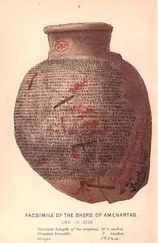Something over an hour later we started upon our upward journey. I was again mounted on the Khan's horse, which having been groomed and fed was somewhat rested, while to Leo a litter had been offered. This he declined, however, saying that he had now recovered and would not be carried like a woman. So he walked by the side of my horse, using his spear as a staff. We passed the fire–pit—now full of dead, white ashes, among which were mixed those of the witch–finder and his horrible cat—preceded by our dumb guide, at the sight of whom, in her pale wrappings, the people of the tribe who had returned to their village prostrated themselves, and so remained until she was gone by.
One of them, however, rose again and, breaking through our escort of priests, ran to Leo, knelt before him and kissed his hand. It was that young woman whose life he had saved, a noble–looking girl, with masses of red hair, and by her was her husband, the marks of his bonds still showing on his arms. Our guide seemed to see this incident, though how she did so I do not know. At any rate she turned and made some sign which the priest interpreted.
Calling the woman to him he asked her sternly how she dared to touch the person of this stranger with her vile lips. She answered that it was because her heart was grateful. Oros said that for this reason she was forgiven; moreover, that in reward for what they had suffered he was commanded to lift up her husband to be the ruler of that tribe during the pleasure of the Mother. He gave notice, moreover, that all should obey the new chief in his place, according to their customs, and if he did any evil, make report that he might suffer punishment. Then waving the pair aside, without listening to their thanks or the acclamations of the crowd, he passed on.
As we went down the ravine by which we had approached the village on the previous night, a sound of chanting struck our ears. Presently the path turned, and we saw a solemn procession advancing up that dismal, sunless gorge. At the head of it rode none other than the beautiful Khania, followed by her great–uncle, the old Shaman, and after these came a company of shaven priests in their white robes, bearing between them a bier, upon which, its face uncovered, lay the body of the Khan, draped in a black garment. Yet he looked better thus than he had ever done, for now death had touched this insane and dissolute man with something of the dignity which he lacked in life.
Thus then we met. At the sight of our guide's white form, the horse which the Khania rode reared up so violently that I thought it would have thrown her. But she mastered the animal with her whip and voice, and called out—"Who is this draped hag of the Mountain that stops the path of the Khania Atene and her dead lord? My guests, I find you in ill company, for it seems that you are conducted by an evil spirit to meet an evil fate. That guide of yours must surely be something hateful and hideous, for were she a wholesome woman she would not fear to show her face."
Now the Shaman plucked his mistress by the sleeve, and the priest Oros, bowing to her, prayed her to be silent and cease to speak such ill–omened words into the air, which might carry them she knew not whither. But some instinctive hate seemed to bubble up in Atene, and she would not be silent, for she addressed our guide using the direct "thou," a manner of speech that we found was very usual on the Mountain though rare upon the Plains.
"Let the air carry them whither it will," she cried. "Sorceress, strip off thy rags, fit only for a corpse too vile to view. Show us what thou art, thou flitting night–owl, who thinkest to frighten me with that livery of death, which only serves to hide the death within."
"Cease, I pray lady, cease," said Oros, stirred for once out of his imperturbable calm. "She is the Minister, none other, and with her goes the Power."
"Then it goes not against Atene, Khania of Kaloon," she answered, "or so I think. Power, forsooth! Let her show her power. If she has any it is not her own, but that of the Witch of the Mountain, who feigns to be a spirit, and by her sorceries has drawn away my guests"—and she pointed to us—"thus bringing my husband to his death."
"Niece, be silent!" said the old Shaman, whose wrinkled face was white with terror, whilst Oros held up his hands as though in supplication to some unseen Strength, saying—"O thou that hearest and seest, be merciful, I beseech thee, and forgive this woman her madness, lest the blood of a guest should stain the hands of thy servants, and the ancient honour of our worship be brought low in the eyes of men."
Thus he prayed, but although his hands were uplifted, it seemed to me that his eyes were fixed upon our guide, as ours were. While he spoke, I saw her hand raised, as she had raised it when she slew or rather sentenced the witchdoctor. Then she seemed to reflect, and stayed it in mid air, so that it pointed at the Khania. She did not move, she made no sound, only she pointed, and, the angry words died upon Atene's lips, the fury left her eyes, and the colour her face. Yes, she grew white and silent as the corpse upon the bier behind her. Then, cowed by that invisible power, she struck her horse so fiercely that it bounded by us onward towards the village, at which the funeral company were to rest awhile.
As the Shaman Simbri followed the Khania, the priest Oros caught his horse's bridle and said to him—"Magician, we have met before, for instance, when your lady's father was brought to his funeral. Warn her, then, you that know something of the truth and of her power to speak more gently of the ruler of this land. Say to her, from me, that had she not been the ambassadress of death, and, therefore, inviolate, surely ere now she would have shared her husband's bier. Farewell, tomorrow we will speak again," and, loosing the Shaman's bridle, Oros passed on.
Soon we had left the melancholy procession behind us and, issuing from the gorge, turned up the Mountain slope towards the edge of the bright snows that lay not far above. It was as we came out of this darksome valley, where the overhanging pine trees almost eclipsed the light, that suddenly we missed our guide.
"Has she gone back to—to reason with the Khania?" I asked of Oros.
"Nay!" he answered, with a slight smile, "I think that she has gone forward to give warning that the Hesea's guests draw near."
"Indeed," I answered, staring hard at the bare slope of mountain, up which not a mouse could have passed without being seen. "I understand—she has gone forward," and the matter dropped. But what I did not understand was—how she had gone. As the Mountain was honeycombed with caves and galleries, I suppose, however, that she entered one of them.
All the rest of that day we marched upwards, gradually drawing nearer to the snow–line, as we went gathering what information we could from the priest Oros. This was the sum of it—From the beginning of the world, as he expressed it, that is, from thousands and thousands of years ago, this Mountain had been the home of a peculiar fire–worship, of which the head heirophant was a woman. About twenty centuries before, however, the invading general named Rassen, had made himself Khan of Kaloon. Rassen established a new priestess on the Mountain, a worshipper of the Egyptian goddess, Hes, or Isis. This priestess had introduced certain modifications in the ancient doctrines, superseding the cult of fire, pure and simple, by a new faith, which, while holding to some of the old ceremonies, revered as its head the Spirit of Life or Nature, of whom they looked upon their priestess as the earthly representative.
Of this priestess Oros would only tell us that she was "ever present," although we gathered that when one priestess died or was "taken to the fire," as he put it, her child, whether in fact or by adoption, succeeded her and was known by the same names, those of "Hes" or the "Hesea" and "Mother." We asked if we should see this Mother, to which he answered that she manifested herself very rarely. As to her appearance and attributes he would say nothing, except that the former changed from time to time and that when she chose to use it she had "all power."
Читать дальше
Конец ознакомительного отрывка
Купить книгу












